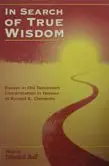

In Search of True Wisdom: Essays in Old Testament Interpretation in Honour of Ronals E. Clements
in Library of Hebrew Bible/Old Testament Studies
Pages
302
Publisher
T&T Clark
Published
3/1/2000
ISBN-13
9781841270715
Inner Books
This physical volume has several internal sections, each of which has been reviewed independently
- The role of Old Testament theology in Old Testament interpretation by Walter Brueggemann
Reviews
Sheffield, England: Sheffield Academic Press, 1999. Pp. 292, Cloth, No Price Available, ISBN 1841270717. Lisbeth S. Fried University of Michigan Ann Arbor, Michigan 48109 This small volume consists of 17 very interesting articles, plus an editor’s preface, contributed in honor of R. Clements. The book includes a short biography of Clements by Rex Mason. The volume presupposes that “wisdom” can serve as an interpretive framework for understanding the Old Testament in its later stages of canonical formation. The articles demonstrate application of postmodern, a-historical approaches to the text, and make an important contribution to the problem of obtaining meaning from ancient writings. G. Auld, in “History-Interpretation-Theology: Issues in Biblical Religion,” asks if the Biblical materials are historical sources. Auld concludes the Bible is historiography written for the present and the future. The deeper (read, theological) significance of the narrative can be meaningful and historical for the present day, even if the stories themselves are not. J. Barton, in “Canon and Old Testament Interpretation,” investigates the role of “canonical criticism.” The canonical approach rejects historical criticism, and argues that something more is needed to get at a text's meaning (i.e., theology). Canonical critics often interpret passages to support their theology. For Barton, the truth of any passage is achieved through traditional historical-critical methods. Canonical interpretations must rest on this truth, or it rests on falsehood. This important dictum is too often ignored. W. H. Bellinger, Jr., in “Enabling Silent Lips to Speak: Literary Criticism in the Service of Old Testament Interpretation,” compares the historical-critical method to that of literary critics. The goal of interpretation is to articulate the important in a text to make explicit what the text only implies.
[Full Review]
